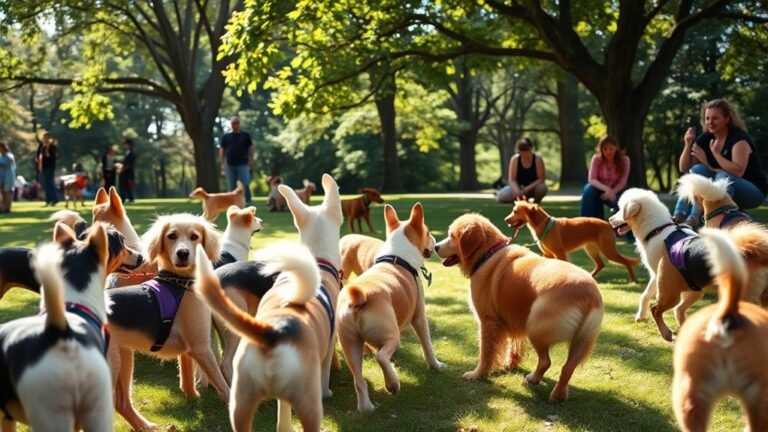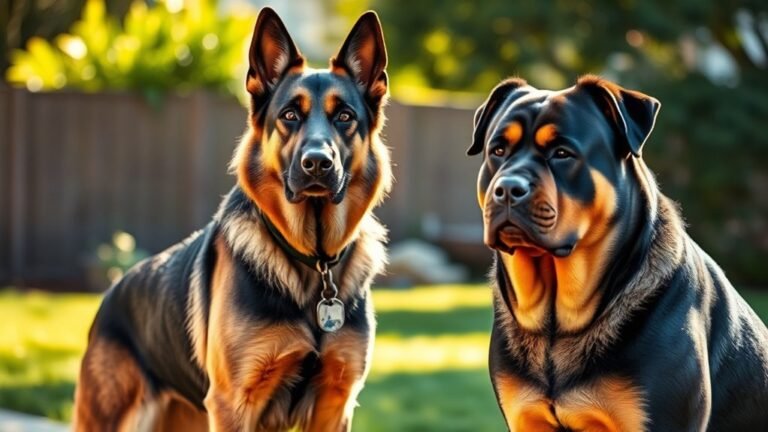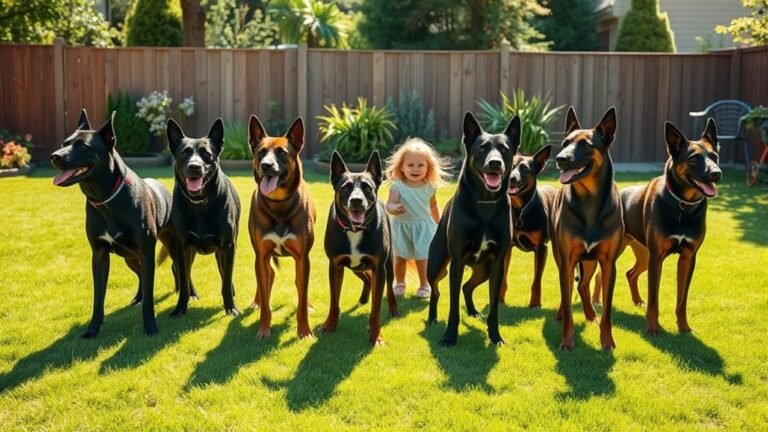Pit Bull Truths: Are They Really Dangerous?
Pit Bulls often get a bad reputation as dangerous dogs. This view comes from things we see in the media and misunderstandings about the breed. To understand Pit Bulls better, we need to look at their history, behavior, and how training affects them.
A big part of a dog’s behavior comes from socialization. When Pit Bulls are raised around people and other animals, they learn to be friendly and calm. It’s important to give them good training and care. This can help change how people see them.
We can work to change the story about Pit Bulls. By sharing positive stories and examples of well-trained Pit Bulls, we can help others see them in a different light. Understanding them better can lead to safer and happier lives for both the dogs and their owners.
Key Takeaways
Pit Bulls are not dangerous by nature. Their behavior often depends on how they are trained and the environment they live in. With the right training, these dogs can be loyal, loving, and protective family pets.
Many times, the media shows Pit Bulls in a bad light. This makes people think they are more dangerous than they really are. In truth, Pit Bulls can be friendly and kind.
To help Pit Bulls behave well, early socialization and responsible ownership are very important. This means getting them used to different people, places, and other animals when they are young.
We can all help change how people see Pit Bulls. By talking in our communities and sharing the facts about their true nature, we can better understand these dogs and show everyone how lovable they can be.
The History of Pit Bulls
Pit Bulls have a long and interesting history. Sadly, many people today see them in a negative light. But their past tells a different story.
Pit Bulls first came from the UK in the 19th century. People bred them for bull-baiting, a cruel sport that showed off their strength and bravery. When bull-baiting was banned, these dogs found new roles. They began helping farmers by herding livestock and also became beloved pets.
Pit Bulls are known for being loyal and protective. This makes them great family dogs. They form strong bonds with people and are often very loving.
This history shows that Pit Bulls have always been valued not just for their work but also for their companionship. Understanding their past can help change how some people see them today. They’re dogs with a rich story of loyalty and love.
Understanding Breed Characteristics
Understanding the traits of Pit Bulls helps us appreciate them as a special breed. These dogs are often loyal, smart, and adaptable.
However, each Pit Bull has its own personality. You might see different behaviors based on their genes, home life, and training. Some Pit Bulls are protective, while others are friendly and playful. Their energy and eagerness to please can make them wonderful pets when given good training.
Knowing these traits helps you create a loving home for your Pit Bull. It strengthens your bond and makes life enjoyable for both of you.
Embracing their unique qualities helps you connect with other Pit Bull lovers, too.
Common Misconceptions About Pit Bulls
Many people think Pit Bulls are aggressive or dangerous. This belief comes from media stories and cultural stereotypes. These ideas create myths that confuse the truth about these dogs.
Pit Bulls are often misunderstood. They act based on how they’re trained and the environment they live in. Aggression isn’t a trait of the breed itself. Instead, it’s caused by factors like socialization and how owners care for them.
When you look closely at the facts, you see that Pit Bulls can be loyal friends. They show love and kindness when treated well.
The Role of Socialization in Behavior
Socialization is very important for Pit Bulls. It helps them learn how to act around people and other animals. When you socialize your dog well, they behave better, which makes everyone happy.
Here are some key points to remember:
- Start socializing early. This helps your dog adjust to new things.
- Let your Pit Bull explore different places. This builds their confidence.
- Spend time with other dogs and people. This reduces fear and tricks like biting.
- Play with other dogs. This helps them learn good social skills.
- Meet lots of different people. This helps them feel less anxious.
How Training Affects Aggression
Training plays a big role in how aggressive behavior shows up in Pit Bulls. A good training plan helps direct their energy in a positive way. When you engage in obedience training, you build a strong bond with your dog. This bond helps you understand each other better and gives you more control.
Using techniques to manage aggression is important. It helps your Pit Bull stay calm in different situations instead of acting out. Regular training reinforces good behaviors, which can stop aggressive habits from starting.
Your hard work in keeping a disciplined space leads to a happy life for both you and your dog. Remember, a well-trained dog is safer and friendlier. This makes it easier to connect with your community and feel like you belong.
Enjoy the time spent training your Pit Bull!
Factors Influencing Aggressive Behavior
Understanding how Pit Bulls act involves looking at several important things, not just their training. While good training is key, other factors also shape a dog’s behavior.
- Genetics: Some Pit Bulls may come from families where aggressive behavior is common.
- Environment: Loud noises or strange sights can make some dogs feel stressed and react aggressively.
- Socialization: How a dog interacts with other animals and people when they’re young can greatly impact their future behavior.
- Owner’s actions: How you handle your dog and your reactions can affect how they behave.
- Health problems: If a dog is in pain or not feeling well, they might show aggression more easily.
Pit Bulls and Family Compatibility
Many people worry about adding a Pit Bull to their family. However, these dogs can do very well in a loving home. Whether a Pit Bull fits into your family depends on how you train and socialize them.
When you first bring a Pit Bull home, it’s important to create positive moments. Teach your kids how to interact with the dog safely and kindly. Kids and Pit Bulls can form strong bonds. These dogs can be very affectionate and protective.
To help your Pit Bull get used to family life, expose them to different environments and situations early on. With regular training and care, Pit Bulls can become loyal and loving family members.
They bring joy and warmth to your home, making it a better place.
Responsible Ownership and Care
Owning a Pit Bull is more than just showing love. It means taking care of your dog in the right way. Your actions can help your dog and make your bond stronger.
Here are some important things to think about:
- Socialization: Let your Pit Bull meet new people, other animals, and different places. This helps your dog behave well.
- Training: Use positive ways to teach your Pit Bull good manners. Keep the training fun and friendly.
- Exercise: Make sure your dog gets daily walks and playtime. This keeps them happy and healthy.
- Health Care: Take your dog to the vet regularly for check-ups and shots. This helps keep your dog feeling great.
- Community Resources: Join local dog clubs or training classes. They can offer help and fun activities for you and your Pit Bull.
Being a responsible owner not only makes your dog happy but also creates a safe and loving home for both of you.
Media Influence on Public Perception
The media has a big impact on how people think about Pit Bulls and their behavior. Sometimes, news stories focus on dog attacks. This can make people scared and create unfair opinions about the breed. These stories often ignore the bigger picture of how all dogs can act. Because of this, more people might feel worried in their communities.
Social media can make these stories even louder and more emotional. This can lead to feelings that are stronger than the facts. It’s important to see how these stories can unfairly label Pit Bulls based on a few bad events.
To change these beliefs, take some time to think about what you read and share. Learn the truth about Pit Bulls, and help spread a more positive view. By doing this, you can help others understand Pit Bulls in a fairer way.
Recognizing Dog Behavior and Body Language
How can you understand how your dog feels? Recognizing their body language and behavior is key. Every dog is different, so paying attention to their signs can strengthen your bond and create safe interactions.
Here are some important signs to look for:
- Tail Position: A wagging tail often means happiness. A low or tucked tail can show fear.
- Ear Position: Perked ears may show interest, while droopy ears can indicate relaxation or submission.
- Eye Contact: Soft eyes might show calmness. If your dog avoids eye contact, they could be feeling unsure.
- Mouth Shape: A relaxed mouth usually means the dog is at ease. A closed mouth might signal caution or tension.
- Body Stance: A relaxed body shows comfort. A tense stance could suggest stress or anxiety.
Understanding these signs helps you know your dog’s mood and respond in the right way. By focusing on these details, you can learn what your dog needs.
This helps build trust and friendship between you two. After all, knowing your dog’s feelings leads to a happy and healthy relationship.
Safe Interaction With Other Dogs
Understanding your dog’s body language is just the first step to having safe playtime with other dogs. Follow some simple rules when you go to the dog park. First, check how other dogs feel before you let your pup say hello. Look at their body position and behavior to keep everyone safe.
When your dog plays with others, watch them closely. Be ready to step in if you see any signs of stress or fighting. If your dog is calm and friendly, give them treats to show it’s good behavior.
Also, make sure your pit bull is friendly with other dogs. This helps them play well together. By keeping an eye on your dog and following these basic rules, you can help create a fun place where dogs can play together happily.
Pit Bulls in the Community
What role do pit bulls have in our communities? These dogs can be important members, helping in many ways. Let’s explore how they contribute to community life.
- Joining community events: Pit bulls often attend local events, showing off their friendly and playful sides. People love seeing them there!
- Spreading awareness: When people see pit bulls, they can change their minds about the breed. This helps others learn that these dogs can be great pets.
- Helping with therapy: Many pit bulls are great at providing comfort. They’re used in therapy programs to help people feel better.
- Bringing people together: Dog parks and training classes help owners meet each other. They can share stories and tips, creating friendships.
- Building strong neighborhoods: Pit bull owners often connect over their experiences, making their neighborhoods feel more close-knit.
Pit bulls can make our communities better and more friendly places.
Advocating for Pit Bull Awareness and Education
Pit bulls often have a hard time because of misunderstandings. We can change how people think about them by sharing information and education. There are many ways to spread the word about pit bulls in a positive way.
Join local events that focus on being a good pet owner. You can tell stories about friendly, well-trained pit bulls. This helps show that they can be great companions.
Support schools and community groups that teach about dog behavior. This helps everyone learn how to interact with dogs better.
Share resources that highlight training and responsible breeding. This way, we can clear up false ideas about pit bulls.
Plus, when you talk about your own experiences with them, you can connect with other pit bull lovers.
By supporting education and awareness, you aren’t just standing up for one breed. You’re helping create a friendly place for every dog lover.
Let’s work together to lift up pit bulls and make the world a better spot for them!
Frequently Asked Questions
Are Pit Bulls More Prone to Aggression Than Other Breeds?
When we compare dog breeds, we need to remember that many things influence a dog’s behavior. This includes where they live, how they are trained, and their social experiences. Because of this, it’s not fair to say that any breed, including pit bulls, is naturally aggressive. Each dog is unique, and their actions depend on how they are raised and treated. Let’s focus on understanding and caring for all dogs, rather than judging them by their breed.
What Is the Average Lifespan of a Pit Bull?
Pit bulls usually live about 10 to 15 years. Many things can affect how long they live, like what they eat and how much they exercise. Staying healthy helps them live longer and feel better.
Can Pit Bulls Be Therapy Dogs?
Yes, pit bulls can be great therapy dogs if they get the right training. They are loyal and loving dogs, which makes them wonderful companions. With proper socialization and therapy dog training, they can connect with people and offer comfort when needed. Therapy dogs help those who may feel sad or lonely by being there for them. So, if a pit bull has the right training, they can make a big difference in someone’s life.
How Much Exercise Do Pit Bulls Need Daily?
Pit bulls need at least 60 minutes of exercise each day. They have a lot of energy, so regular walks and playtime are important. These activities help keep them healthy and happy.
Playing with your pit bull can also make your bond stronger. Take them to a park, play fetch, or just run around in the yard. Mental games, like puzzles or training, are great too. Remember, happy and tired pit bulls are the best pets!
Are Pit Bulls Good With Children?
Are Pit Bulls Good With Children?
Pit bulls can be good with children. They often become loving friends to kids. To help them bond well, it’s important to train them and socialize them from a young age. Positive training can teach them how to behave around kids.
When pit bulls get to know children, they can create strong friendships. They enjoy playtime and can be very gentle. To make sure everyone stays safe, adults should always supervise their interactions.
In short, with the right training and care, pit bulls can make great companions for children. They can show love and loyalty, just like other breeds.







